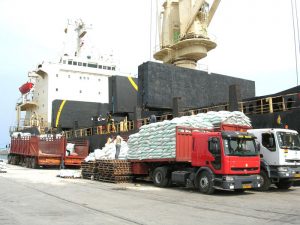President Akufo Addo, on Thursday, 17th June 2021 commissioned the new factory of Premium Foods Limited, a company operating under Government’s 1-District-1-Factory initiative at Kwaso in the Ejisu Municipality of the Ashanti Region.
According to Akufo Addo, the establishment of the factory is a concrete manifestation that the new paradigm of economic development of insisting on value-addition industrial activities within a conducive and business-friendly environment is making headway.
“This afternoon’s ceremony is in fulfilment of the promise by Government, in partnership with the private sector, to set up at least one medium to large scale enterprise in every district of Ghana,” the President said.
He noted that Premium Foods is a classic example of the critical role agricultural production and value addition play in economic development of countries, adding that “the contribution of Premium Foods Limited highlights Ghanaian ingenuity, entrepreneurial spirit, as well as the fortitude to succeed no matter the challenge”.
Over the years, Premium Foods has supplied blended fortified and non-fortified products, and ingredients to global organizations, including international relief organizations, and multinational food and beverage manufacturing companies across Africa, including “Feed the Future” programme, under the US Government’s Global Hunger & Food Security Initiative.
Having invested in this new state-of-the-art manufacturing facility, with the capacity to blend over ninety-six thousand (96,000) metric tonnes annually of maize, soybean, sorghum and millet, the President was pleased to note that Premium Foods is one of the few manufacturing factories with such capabilities in West Africa.
“I am pleased to learn that this new factory is generating some one hundred and twenty (120) new jobs, made up of technical and management professionals, and is creating thousands of indirect income earning opportunities for farmers and out-growers along the value chain, mostly women and youth, in all parts of the country,” President Akufo-Addo said.

He reinterred Government’s support to supporting private sector operators, like Premium Foods, to become globally competitive, and, thereby, take advantage of market integration frameworks such as the African Continental Free Trade Area (AfCFTA), whose Secretariat has been established and commissioned in Accra.
“To this end, Government, as at December 2020, has granted import duty exemptions to thirty-six (36) companies, under the 1D1F programme, amounting to some four hundred and thirty-five million cedis (GH¢435 million),” he said.
The President continued, “The main sectors that have benefited from the exemptions are agro-processing, ceramics manufacturing, hardware manufacturing, and vehicle assembly plants. Prospective companies desirous of establishing such ventures, under the 1D1F initiative, are assured of Government’s unwavering support, and I appeal to them to join hands with Government in the journey to industrialize Mother Ghana, and help create jobs for Ghanaian youth in all parts of the country”.
President Akufo-Addo commended the collaboration between the World Food Programme (WFP), the Canadian High Commission in Ghana, the United States Agency for International Development (USAID), the Alliance for a Green Revolution in Africa (AGRA), the African Development Bank (AfDB), Department for International Development (DFID), the J.A Kufuor Foundation, as well as local participating financial institutions for providing both technical and financial support to this project.
“I commend also the proprietors and management of Premium Foods Ltd., led by Mr. Tom Gambrah, a seasoned Ghanaian entrepreneur, for spearheading the establishment of this state-of-the-art manufacturing facility. I am confident that the best days of Premium Foods Ltd., and, indeed, of Mother Ghana, lie ahead,” he added.
Background:
The “One District One Factory” Initiative is a key component of the Industrial Transformation Agenda of the NPP Government. The concept was first introduced by the Ministry of Trade and Industry and Presidential Special Initiatives during the past New Patriotic Party (NPP) Administration, as part of an integrated programme for Accelerated Growth and Industrial Development. Originally designated as the Rural Enterprises Development Programme, and later rebranded as the District Industrialization Programme (DIP). It was designed as a comprehensive programme for rural industrialization, involving the setting up of at least one medium to large scale factory in each of the administrative districts of Ghana.
While previous attempts at rural economic revitalization in Ghana had focused mainly on the provision of physical infrastructural facilities, the DIP focuses on the promotion of commercially viable business development initiatives, to generate sustainable and accelerated economic development in rural communities.
The Programme seeks to address the challenge of severe poverty and underdevelopment among rural communities, through the establishment of an institutional framework that will attract private sector investments in rural development activities. It also seeks to promote local participation in economic development, and encourage new community-based public/private partnerships.
The initiative aims to achieve this through a massive private sector-led nationwide industrialization drive, which will equip and empower communities to utilize their local resources in manufacturing products that are in high demand both locally and internationally. This will allow the country to reap the rewards of industrialization, increase agricultural and manufacturing output, reduce reliance on imports and increase food availability.
The programme is designed to achieve five strategic objectives which include the following:
- To create massive employment particularly for the youth in rural and peri-urban communities, thereby improve income levels and standard of living, as well as reduce rural-urban migration.
- To add value to the natural resources of each district and exploit the economic potential of each district based on its comparative advantage.
- To ensure even and spatial spread of industries and thereby stimulate economic activity and growth in different parts of the country.
- To enhance the production of local substitutes for imported goods and thereby conserve scarce foreign exchange.
- To promote exports and increase foreign exchange earnings to support the government’s development agenda.






